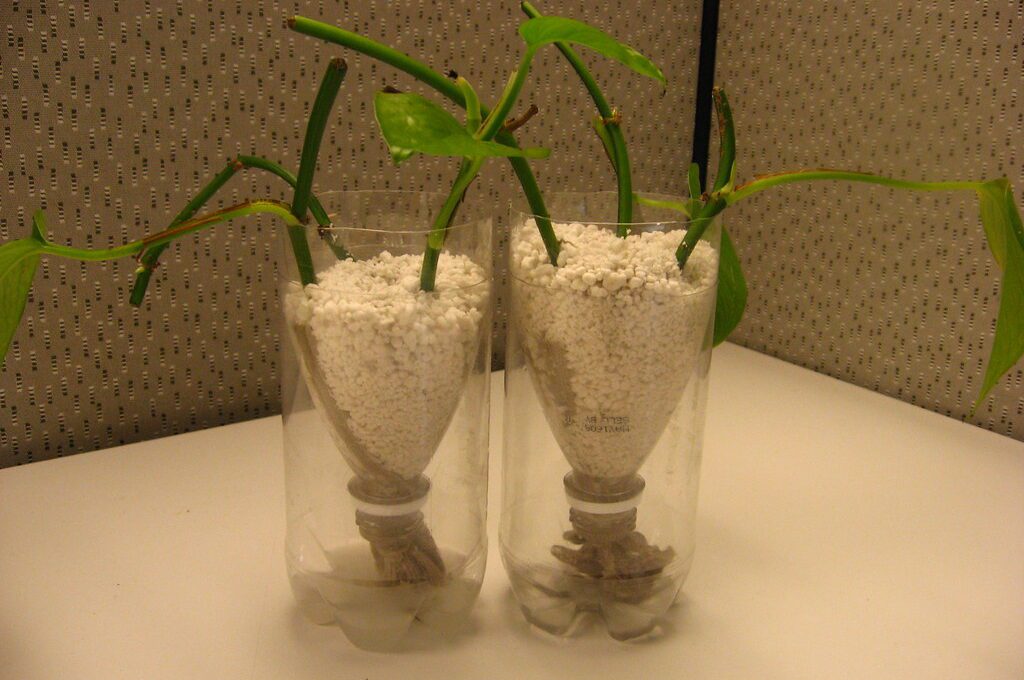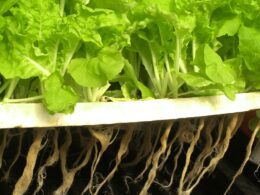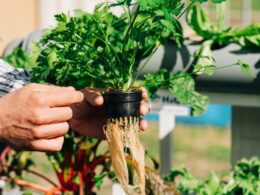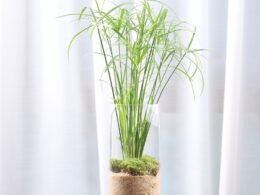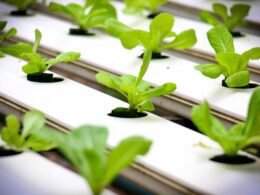Are you interested in hydroponics but worried about keeping your water fresh? Proper water management is crucial for the success of your hydroponic system.
Maintaining the quality of your water can prevent the growth of harmful pathogens and ensure that your plants receive all the necessary nutrients.
In this article, we will guide you through the steps to keep your water fresh in hydroponics. From monitoring pH and nutrient levels to implementing maintenance and cleaning procedures, we will provide you with practical advice to help you maintain a healthy and thriving hydroponic system.
So, let’s dive in and discover the secrets to keeping your water fresh in hydroponics!
Understand the Importance of Proper Water Management
Properly managing your H2O is crucial in maintaining a successful hydroponic system. Water quality is essential in ensuring that your plants receive the necessary nutrients for growth. Poor water quality can lead to stunted growth and even death of your plants.
To maintain good water quality, you must regularly test the pH level and nutrient content of your water. This way, you can adjust the water quality to suit the specific needs of your plants. Exploring the relationship between water quality and nutrient uptake is also crucial in hydroponics.
In hydroponic systems, plants rely on nutrient-rich water instead of soil for their growth. This means that the water quality greatly affects the plants’ ability to absorb nutrients. If the water quality is poor, the plants will have difficulty absorbing the necessary nutrients for growth. Therefore, it is essential to maintain good water quality to ensure that your plants are receiving the required nutrients.
The role of dissolved oxygen in hydroponic water management cannot be overlooked. Oxygen is vital for the survival of plants, and without it, the plants will die. In hydroponic systems, the water must be adequately oxygenated to keep the plants healthy. This is because the roots of hydroponic plants are submerged in water, and the lack of oxygen can lead to root rot.
To avoid this, it is essential to ensure that your hydroponic system has adequate dissolved oxygen levels to keep your plants healthy and thriving. In summary, managing your H2O is critical in maintaining a successful hydroponic system. Water quality and nutrient uptake have a close relationship, and it is crucial to maintain good water quality to ensure that your plants are receiving the necessary nutrients. Additionally, dissolved oxygen plays a crucial role in hydroponic water management and should not be overlooked.
By paying attention to your water management, you can maintain a thriving hydroponic system and ensure the safety and health of your plants.
Monitor and Adjust pH Levels
Monitoring and adjusting pH levels is essential for maintaining a thriving hydroponic system. This ensures your plants receive the proper nutrients and avoids potential disasters that can harm your hard-earned harvest.
The pH level of your hydroponic water should be between 5.5 and 6.5, as this is the optimal range for most plants. If the pH level is too high or too low, your plants won’t be able to absorb the nutrients they need, leading to stunted growth or even death.
To monitor the pH level of your hydroponic water, you’ll need a pH meter, which can be purchased at any hydroponic supply store. Once you have your meter, you’ll need to calibrate it using pH buffer solutions to ensure accurate readings. It’s important to calibrate your meter regularly, as a poorly calibrated meter can give inaccurate readings and lead to disastrous consequences.
Adjusting the pH level of your hydroponic water is simple. If the pH level is too high, you can lower it by adding pH-down solution. If the pH level is too low, you can raise it by adding pH-up solution. It’s important to add these solutions in small increments and retest the pH level after each addition to avoid overcompensating and causing further problems.
By monitoring and adjusting the pH level of your hydroponic water, you can ensure your plants receive the nutrients they need and avoid potential problems that can harm your harvest.
Regularly Test Nutrient Levels
To maximize the growth and yield of your hydroponic plants, it’s crucial to regularly test nutrient levels and make adjustments as needed. Nutrient balance is key in hydroponics, as the plants rely solely on the water for their nutrients. Testing the nutrient levels allows you to ensure that the plants are receiving the right balance of nutrients needed for optimal growth.
Regularly testing the water quality is also important in hydroponics. The water quality can affect the health of the plants, and poor water quality can lead to stunted growth or even death of the plants. By testing the water quality, you can identify any issues and take the necessary steps to correct them.
To ensure that your hydroponic plants are getting the best possible care, consider the following tips:
- Test the nutrient levels at least once a week to maintain optimal nutrient balance
- Use high-quality nutrients specifically designed for hydroponic systems
- Monitor the pH levels to ensure that they are within the optimal range for your plants
- Conduct regular water quality tests to identify any issues and correct them as needed
By regularly testing nutrient levels and water quality, you can help ensure that your hydroponic plants are healthy and thriving. With a little extra effort, you can enjoy a bountiful harvest of fresh, delicious produce.
Can Oxygenation Methods Used in Hydroponics also be Applied to Keeping Water Fresh in Other Settings?
Can oxygenation methods used in hydroponics also be applied to keeping water fresh in other settings? Yes, there are alternative ways of oxygenating water without a pump. Techniques like aeration stones, adding oxygen-releasing chemicals, or utilizing aquatic plants can help maintain water freshness in various environments, offering benefits beyond just hydroponics.
Use Appropriate Water Treatment Methods
Make sure your hydroponic plants are healthy and thriving by using appropriate water treatment methods. One of the most important aspects of this is water filtration. Filters can remove impurities and contaminants that could harm your plants. It’s important to choose a filter that is appropriate for your hydroponic system and the type of water you’re using.
In addition to filtration, disinfection is also an important water treatment method. Disinfection can kill harmful bacteria and pathogens that could infect your plants. Chlorine is a common disinfectant used in hydroponics, but it’s important to use it in the correct concentration. Over-chlorination can harm plants, so it’s important to follow instructions carefully.
Overall, using appropriate water treatment methods is crucial in keeping your hydroponic plants healthy and thriving. By incorporating water filtration and disinfection, you can ensure that your plants are receiving clean and safe water. This will not only benefit your plants, but also your own peace of mind knowing that you’re providing a safe and healthy environment for them to grow.
Implement Maintenance and Cleaning Procedures
It’s essential to regularly clean and maintain your hydroponic system to keep it running smoothly, like giving your garden a much-needed spring cleaning. Without proper maintenance and cleaning, your system could become a breeding ground for harmful bacteria and algae, which could lead to poor plant growth or even crop failure.
To avoid this, it’s important to implement a cleaning schedule and equipment maintenance routine. When it comes to cleaning your hydroponic system, you should aim to do so at least once every few weeks. This will help prevent the buildup of algae and other unwanted materials that can clog your system and cause problems down the line.
Additionally, you should clean your equipment regularly, including pumps, filters, and tubing, to ensure that everything is working properly and efficiently. Incorporating maintenance and cleaning procedures into your hydroponic system routine can be time-consuming, but it’s well worth the effort in the end.
Not only will it help keep your plants healthy and thriving, but it will also help prevent costly repairs and replacements in the long run. By staying on top of your cleaning schedule and equipment maintenance, you can ensure that your hydroponic system runs smoothly for years to come.
Frequently Asked Questions
What are the common water treatment methods used in hydroponics?
When it comes to hydroponics, it’s important to ensure the water you’re using is clean and balanced. This is where water filtering and pH balancing come in.
Water filtering involves removing any impurities or contaminants from the water, such as chlorine or sediment, to keep it clean and fresh.
pH balancing, on the other hand, ensures that the pH level of the water is within the appropriate range for the plants you’re growing. Maintaining a balanced pH level is crucial for the health and growth of your plants.
By implementing these common water treatment methods in your hydroponic system, you can ensure that your plants are getting the clean, balanced water they need to thrive.
How often should I clean and maintain my hydroponic system to keep the water fresh?
To keep the water in your hydroponic system fresh, it’s important to perform regular maintenance and cleaning. The frequency of maintenance will depend on factors such as the size of your system and the type of plants you’re growing, but a general rule of thumb is to clean your system every three to four weeks.
When cleaning your system, use a non-toxic cleaning solution and scrub all surfaces thoroughly to remove any buildup or algae. Additionally, make sure to regularly check and adjust the pH and nutrient levels of your water to ensure optimal plant growth.
By staying on top of maintenance and cleaning techniques, you can help ensure a healthy and thriving hydroponic system.
What are some signs that indicate my water may be contaminated or not fresh in my hydroponic system?
To ensure the freshness of your hydroponic water, it’s important to focus on water contamination prevention and maintain the proper pH balance.
Signs of contaminated water can include a foul smell or discoloration, but it’s best to prevent contamination before it occurs. This can be done by regularly cleaning and maintaining your system, using high-quality water sources, and avoiding overfeeding your plants.
Additionally, monitoring and adjusting the pH balance of your water is crucial for the health of your plants and to prevent the growth of harmful bacteria.
By taking these steps, you can ensure that your hydroponic system is providing clean, fresh water for your plants to thrive.
Are there any natural methods to keep water fresh in hydroponics?
If you want to keep your hydroponic water fresh, there are a few natural additives you can use. One option is to add neem oil, which has antibacterial properties that can prevent the growth of harmful microorganisms.
You can also add hydrogen peroxide to your water to help oxygenate it and prevent the growth of algae. Another natural option is to use UV sterilization, which can kill bacteria and other pathogens in the water.
This method involves exposing the water to ultraviolet light, which breaks down the DNA of pathogens and prevents them from reproducing. By using these natural methods, you can keep your hydroponic water fresh and free from harmful contaminants.
How can I prevent algae growth in my hydroponic water system?
To prevent algae growth in your hydroponic water system, there are a few things you can do. First, make sure to keep the water sterilized. This can be done using UV sterilizers, ozonators, or hydrogen peroxide.
Additionally, avoid exposing the water to direct sunlight, as this can encourage algae growth. You can also use algae inhibitors or natural methods, such as adding barley straw to the water.
Keeping your water clean and algae-free is crucial for the health of your plants and the overall success of your hydroponic system.
Conclusion
So, there you have it! Keeping your hydroponic water fresh is crucial to the success of your plants.
To maintain proper water management, monitor and adjust pH levels regularly, and test nutrient levels frequently. It’s also important to use appropriate water treatment methods and implement maintenance and cleaning procedures.
By following these simple steps, you can ensure that your hydroponic system is running smoothly and your plants are getting the nutrients they need.
Remember to stay on top of water management and don’t hesitate to make adjustments as needed. With a little bit of effort, you can enjoy a thriving hydroponic garden all year round!





